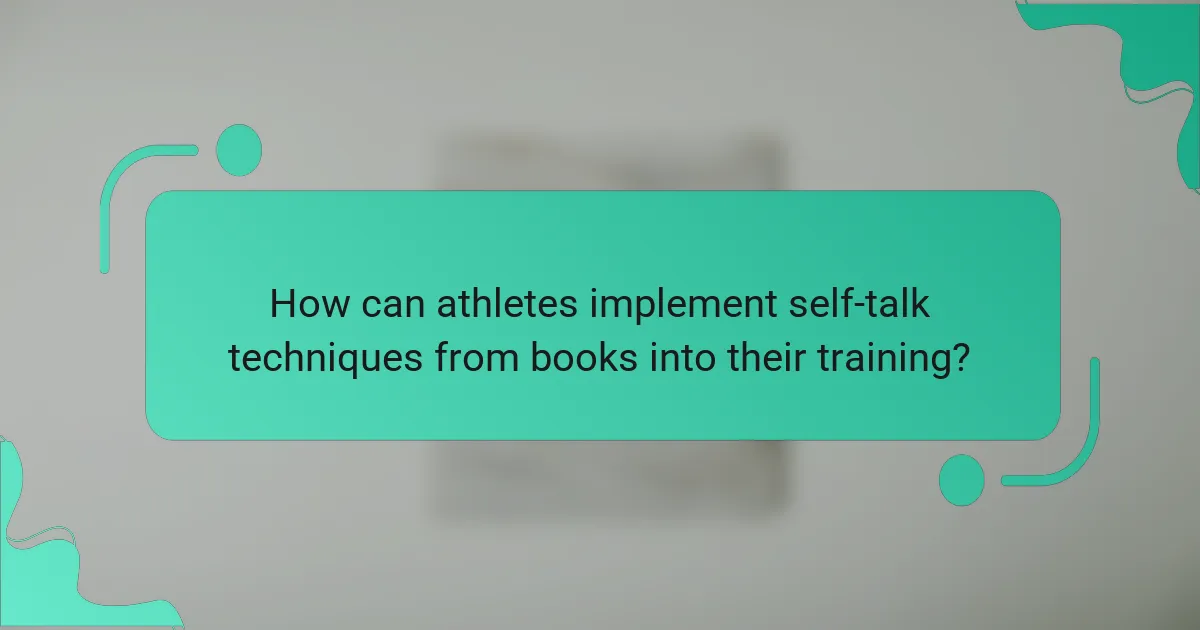Mastering inner dialogue is essential for athletes seeking to boost confidence and enhance performance. Self-help books provide effective strategies like visualization, affirmations, and mindfulness to improve focus and resilience. These resources emphasize the importance of a growth mindset and emotional regulation, helping athletes achieve optimal outcomes during competitions. By integrating these techniques, athletes can transform their mental approach and gain a competitive edge.

What is the significance of self-talk for athletes?
Self-talk is crucial for athletes as it significantly influences performance and confidence. Positive inner dialogue can enhance focus, reduce anxiety, and foster resilience during competition. Research indicates that effective self-talk strategies can lead to improved outcomes, such as faster recovery and better skill execution. Athletes who master their inner dialogue often report heightened motivation and a stronger belief in their abilities.
How does inner dialogue impact performance?
Inner dialogue significantly impacts performance by shaping athletes’ confidence and focus. Positive self-talk enhances motivation, reduces anxiety, and improves concentration. Research indicates that athletes who engage in constructive inner dialogue perform better under pressure. For instance, a study found that effective self-talk can lead to a 10% increase in athletic performance. Additionally, mastering inner dialogue helps athletes maintain composure during competition, allowing for optimal execution of skills.
What are common themes in self-help books for athletes?
Self-help books for athletes commonly focus on mastering inner dialogue, boosting confidence, and enhancing performance. These themes are essential for mental resilience and peak performance.
Many self-help books emphasize the importance of positive self-talk, encouraging athletes to replace negative thoughts with constructive affirmations. This shift in inner dialogue can significantly impact performance outcomes.
Confidence-building strategies often include visualization techniques and goal-setting methods. These practices help athletes envision success and create actionable plans to achieve their objectives.
Additionally, performance enhancement is frequently addressed through mental conditioning exercises. Techniques such as mindfulness and focus training enable athletes to maintain concentration and manage stress during competition.

What universal benefits do athletes gain from mastering self-talk?
Athletes gain enhanced focus, increased confidence, and improved resilience from mastering self-talk. These universal benefits lead to better performance under pressure, fostering a positive mindset that promotes goal achievement. Studies show that athletes who practice positive self-talk experience reduced anxiety and greater motivation, directly impacting their competitive edge. Additionally, effective self-talk strategies can help athletes maintain composure during challenging situations, allowing for optimal decision-making and execution.
How does positive self-talk enhance confidence?
Positive self-talk significantly enhances confidence by reinforcing a positive self-image and reducing anxiety. Athletes who engage in constructive inner dialogue experience improved performance through increased motivation and focus. This method promotes resilience, enabling athletes to overcome challenges and setbacks more effectively. Studies indicate that positive affirmations can lead to measurable improvements in self-esteem and overall athletic performance.
What role does visualization play in self-talk?
Visualization significantly enhances self-talk by creating mental images that reinforce positive affirmations. This practice helps athletes internalize confidence and boosts performance. By vividly imagining successful outcomes, athletes can reduce anxiety and improve focus. Visualization acts as a unique attribute of effective self-talk, transforming inner dialogue into actionable motivation. As a result, athletes experience improved mental clarity and resilience during competition.
How can self-talk improve focus during competitions?
Self-talk can significantly enhance focus during competitions by fostering a positive mindset. By using affirmations and motivational phrases, athletes can reduce anxiety and maintain concentration. Research indicates that effective self-talk strategies improve performance metrics, such as reaction time and decision-making speed, leading to better outcomes in competitive settings.

What unique strategies do top athletes use for effective inner dialogue?
Top athletes utilize unique strategies for effective inner dialogue, such as visualization, affirmations, and mindfulness. Visualization involves imagining successful performances, which boosts confidence and prepares the mind for challenges. Affirmations reinforce positive self-talk, helping athletes maintain focus and resilience. Mindfulness practices enhance awareness of thoughts, allowing for better management of negative self-talk. These strategies are often detailed in self-help books tailored for athletes, emphasizing their importance in mastering inner dialogue and enhancing performance.
How do elite athletes personalize their self-talk techniques?
Elite athletes personalize self-talk techniques by tailoring affirmations and visualizations to their specific goals. They often employ unique phrases that resonate with their personal experiences and challenges. This customization enhances motivation and reinforces a positive mindset during training and competition. For instance, a runner might use “I am strong and fast” to build confidence before a race. This individualized approach fosters resilience and mental clarity, ultimately boosting performance.
What are the most impactful self-help books recommended by professional athletes?
Self-help books recommended by professional athletes focus on mastering inner dialogue, boosting confidence, and enhancing performance. Notable titles include ‘The Inner Game of Tennis’ by W. Timothy Gallwey, which emphasizes mental strategies for peak performance, and ‘Relentless’ by Tim S. Grover, highlighting the mindset of elite athletes. ‘Mindset’ by Carol S. Dweck explores the power of a growth mindset, while ‘Can’t Hurt Me’ by David Goggins details overcoming adversity. ‘Atomic Habits’ by James Clear offers practical techniques for habit formation, essential for athletes aiming to improve their routines.
Which authors are leading in this niche?
Top authors in the self-help niche for athletes include Jim Afremow, who emphasizes mental toughness, and Brian Cain, known for his focus on peak performance. Other notable names are Dr. Michael Gervais, who integrates psychology into sports, and Dr. Chris Carr, who specializes in confidence-building techniques. Each author offers unique strategies that enhance inner dialogue and performance.
What specific techniques do these books suggest?
Self-help books for athletes suggest techniques like visualization, positive affirmations, and mindfulness practices. These methods enhance inner dialogue, boost confidence, and improve performance. Visualization involves mentally rehearsing successful outcomes. Positive affirmations reinforce self-belief and resilience. Mindfulness practices help athletes stay focused and manage stress effectively.

What rare insights can be found in self-help literature for athletes?
Self-help literature for athletes offers rare insights into mastering inner dialogue, boosting confidence, and enhancing performance. These books often reveal unique strategies that focus on mental resilience, visualization techniques, and the importance of a growth mindset. For instance, many authors emphasize the power of positive affirmations as a tool to combat self-doubt and improve focus during competition. Additionally, studies indicate that athletes who engage in regular self-reflection through journaling experience enhanced emotional regulation, leading to better performance outcomes. By integrating these insights, athletes can cultivate a more effective mental approach to their training and competitions.
How do cultural differences influence self-talk among athletes?
Cultural differences significantly shape self-talk among athletes, influencing their mental strategies and performance. For example, collectivist cultures often emphasize team success, leading to self-talk that fosters group cohesion, while individualistic cultures may promote personal achievement, resulting in self-talk focused on personal goals. These variations can affect an athlete’s confidence and motivation, as cultural context dictates the internal dialogue that drives performance. Understanding these dynamics can help in tailoring self-help strategies in books to better suit athletes from diverse backgrounds.
What uncommon practices are suggested by niche authors?
Uncommon practices suggested by niche authors include visualization techniques, journaling for self-reflection, and mindfulness exercises tailored for athletes. These methods enhance inner dialogue and boost confidence. For instance, authors may recommend creating detailed mental images of successful performances to reinforce positive outcomes. Journaling can help athletes track their thoughts and emotions, enabling them to identify patterns that affect performance. Mindfulness exercises, such as focused breathing, can ground athletes during high-pressure situations, promoting mental clarity and focus.

How can athletes implement self-talk techniques from books into their training?
Athletes can effectively implement self-talk techniques from books by practicing affirmations, visualization, and structured self-reflection. These techniques enhance confidence and focus during training.
Affirmations involve repeating positive statements to reinforce self-belief. Visualization allows athletes to mentally rehearse performance scenarios, improving readiness and reducing anxiety. Structured self-reflection encourages athletes to analyze their thoughts and emotions, leading to better emotional regulation.
By incorporating these practices consistently, athletes can transform their inner dialogue, leading to improved performance outcomes.
What are the best practices for integrating self-talk into daily routines?
Integrating self-talk into daily routines enhances mental resilience and performance. Start by setting specific times for positive affirmations, such as before training or competition. Incorporate self-talk during workouts to maintain focus and motivation. Use reminders, like sticky notes or phone alerts, to reinforce positive dialogue throughout the day. Track your progress in a journal to identify effective phrases and their impact on performance. Regular practice fosters a habit, making positive self-talk a natural part of your routine.
What common mistakes should athletes avoid when applying self-talk strategies?
Athletes should avoid several common mistakes when applying self-talk strategies. First, they often use negative language, which can undermine confidence. Second, they may rely on vague statements instead of specific affirmations, reducing effectiveness. Third, inconsistency in practice can hinder progress, as regular reinforcement is essential. Lastly, neglecting to tailor self-talk to individual needs can lead to a lack of personal relevance, diminishing motivation.
How can feedback loops enhance the effectiveness of self-talk?
Feedback loops significantly enhance the effectiveness of self-talk by creating a cycle of reflection and improvement. When athletes engage in self-talk, they can assess their performance and adjust their inner dialogue accordingly. This process fosters a deeper understanding of their thoughts and emotions, leading to increased confidence and performance enhancement. By regularly evaluating the impact of their self-talk, athletes can refine their strategies, ensuring that their inner dialogue remains positive and constructive. This iterative approach helps in developing a resilient mindset, crucial for overcoming challenges in sports.

What are the future trends in self-help literature for athletes?
Self-help literature for athletes is increasingly focusing on mental resilience, personalized strategies, and holistic approaches. Future trends include integrating technology, such as apps for mental training, and emphasizing the importance of emotional intelligence. Additionally, there will be a shift towards evidence-based practices, with more books supported by scientific research on psychology and performance. Unique attributes, like the incorporation of mindfulness techniques, will become more prevalent, enhancing athletes’ inner dialogue and confidence.
What changes can be expected in self-talk methodologies by 2025?
By 2025, self-talk methodologies will likely emphasize technology integration, personalized approaches, and evidence-based practices. Athletes will increasingly use apps and AI to enhance their inner dialogue, fostering confidence and performance. Personalized self-talk strategies will adapt to individual needs, focusing on unique attributes like mindset and emotional regulation. Research will continue to validate effective techniques, making them more accessible and applicable across various sports disciplines.
How is technology influencing self-talk practices for athletes?
Technology is significantly enhancing self-talk practices for athletes by providing tools for mental conditioning and performance analysis. Mobile apps and wearable devices offer personalized feedback, allowing athletes to track their progress and adjust their inner dialogue effectively. Virtual reality training environments immerse athletes in scenarios that challenge their self-talk, fostering resilience and focus. Additionally, online communities and forums facilitate sharing strategies for positive self-talk, creating a support network that reinforces confidence. The integration of artificial intelligence in coaching also tailors self-talk techniques to individual needs, optimizing mental preparation.
